|
Books Should Be Free Loyal Books Free Public Domain Audiobooks & eBook Downloads |
|
|
Books Should Be Free Loyal Books Free Public Domain Audiobooks & eBook Downloads |
|
Religion |
|---|
|
Book type:
Sort by:
View by:
|
By: Arthur Machen (1863-1947) | |
|---|---|
 The Angels of Mons
The Angels of Mons
The Angels of Mons is a popular legend about a group of angels who supposedly protected members of the British army in the Battle of Mons at the outset of World War I. The story is fictitious, developed through a combination of a patriotic short story by Arthur Machen, rumours, mass hysteria and urban legend, claimed visions after the battle and also possibly deliberately seeded propaganda. | |
By: Arthur Pink (1886-1952) | |
|---|---|
 Sovereignty of God
Sovereignty of God
In the following pages an attempt has been made to examine anew in the light of God's Word some of the profoundest questions which can engage the human mind. | |
By: Asa Gray (1810-1888) | |
|---|---|
 Natural Science and Religion
Natural Science and Religion
Asa Gray was a highly-regarded botanist at Harvard University and a friend and collaborator of Charles Darwin. As a Christian, Gray was concerned with the disconnect developing through the nineteenth century between the growing understanding of the natural world and the traditional worldview assumed by orthodox Christianity. This book presents two lectures he gave to theology students at Yale College in which he argues that a disconnect is not inevitable, but that a Christian perspective can and should incorporate current understanding of the world provided by natural science. - Summary by BarryGanong | |
By: Athanasius of Alexandria | |
|---|---|
 On the Incarnation
On the Incarnation
This treatise and that which in the editions of Athanasius immediately precedes it, the contra Gentes, were often counted as two parts of a single work. The two books belong to the earlier years of Athanasius: the Arian controversy which broke out about 319 has left no trace upon them. The Contra Gentes leaves the reader face to face with this necessity of restoration by the Divine Word as the remedy for corrupt human nature. How this necessity is met in the Incarnation is shown in the pages which follow... | |
 Later Treatises of Saint Athanasius, Archbishop of Alexandria
Later Treatises of Saint Athanasius, Archbishop of Alexandria
The times, for which God raised up Saint Athanasius, have, in many respects, a counterpart in our own. There is, now too, earnest, ever-enlarging, adherence to the faith, in those who hold it. But there is also a wide-spread dislike of definite doctrine, such as found a vent in the different shades of Arianism. They framed eleven Creeds, to satisfy themselves or others, over-against the one faith, put forth at Nicaea and accepted by the whole Church. They swung to and fro, at times approximating nearer to the truth; but their secret maxim, unknown to themselves, was, "anything but the Truth"... | |
By: Augustus M. Toplady (1740-1778) | |
|---|---|
 Observations and Reflections
Observations and Reflections
These considerations by Mr. Toplady, and the extracts, are arranged under their respective heads. Diamonds never appear so splendid, as when set in a crown. However, when thrown in confusion, they are still jewels, and therefore worth the gathering. -- From these brilliants a bouquet is made up, for the gratification of the reader. - Summary by the Editor | |
By: B. J. Griswold | |
|---|---|
 Crayon and Character
Crayon and Character
CRAYON AND CHARACTERTruth Made Clear Through Eye and EarBy B.J. GRISWOLDThe Plan of the Book In the preparation of this book the author has had two great plans in mind: To prepare a work which will enable any person, who can speak to a class or an audience, to give a helpful, inspiring illustrated talk; to place in the hands of parents everywhere a book to enable them to teach the children a simple, fascinating method of drawing and, at the same time make the great truths of life a part of their every-day learning... | |
By: Baba Premanand Bharati (1857-1914) | |
|---|---|
 Sree Krishna, The Lord of Love
Sree Krishna, The Lord of Love
I beg to present this my humble work to the English reader. It is the history of the Universe from its birth to its dissolution. I have explained the science of creation, its making and its mechanism. In doing so I have drawn my information from the recorded facts in the Sacred Books of the Root Race of mankind. Some facts and explanations are herein furnished for the first time in any modern language. This book embodies true Hinduism. | |
By: Bahá'u'lláh | |
|---|---|
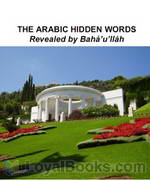 The Arabic Hidden Words
The Arabic Hidden Words
Kalimát-i-Maknúnih or The Hidden Words is a book written in Baghdad around 1857 by Bahá'u'lláh, the founder of the Bahá'í Faith. This work is written partly in Arabic and partly in Persian. The Hidden Words is written in the form of a collection of short utterances, 71 in Arabic and 82 in Persian, in which Bahá'u'lláh claims to have taken the basic essence of certain spiritual truths and written them in brief form. Bahá'ís are advised by `Abdu'l-Bahá, the son of Bahá'u'lláh to read them every day and every night and to implement its latent wisdom into their daily lives... | |
By: Bahá’u'lláh | |
|---|---|
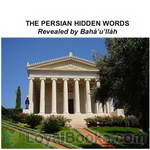 The Persian Hidden Words
The Persian Hidden Words
Kalimát-i-Maknúnih or The Hidden Words is a book written in Baghdad around 1857 by Bahá’u'lláh, the founder of the Bahá’í Faith. This work is written partly in Arabic and partly in Persian. The Hidden Words is written in the form of a collection of short utterances, 71 in Arabic and 82 in Persian, in which Bahá’u'lláh claims to have taken the basic essence of certain spiritual truths and written them in brief form. Bahá’ís are advised by `Abdu’l-Bahá, the son of Bahá’u'lláh to read them every day and every night and to implement its latent wisdom into their daily lives... | |
By: Barbara Hofland (1770-1844) | |
|---|---|
 The Barbadoes Girl
The Barbadoes Girl
Matilda Sophia Hanson, whose father has recently died in their country of Barbadoes in the West Indies, must live for a time with family friends in England. The Harewood family is astonished at how spoiled, rude, and uneducated the child is. However, with seemingly endless patience and love, they help Matilda work to conquer her bad temper, and become a sensible, good, and well-informed young lady. This story reminds children and adults alike, though you have many battles with yourself, you must never relinquish hope and be assured you will find every victory easier than the last... | |
By: Baron Paul Henri Thiry d'Holbach (1723-1789) | |
|---|---|
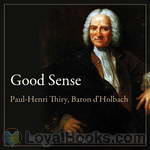 Good Sense
Good Sense
In 1770, Baron D'Holbach published his masterpiece, "Systeme de la Nature", which for a long time passed as the posthumous work of M. de Mirabaud. That text-book of "Atheistical Philosophy" caused a great sensation, and two years later, 1772, the Baron published this excellent abridgment of it, freed from arbitrary ideas; and by its clearness of expression, facility, and precision of style, rendered it most suitable for the average student. This text is based on an undated English translation of "Le Bon Sens" published c. 1900. The name of the translator was not stated. | |
By: Basil Joseph Mathews (1879-1951) | |
|---|---|
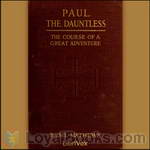 Paul the Dauntless
Paul the Dauntless
“We shall in this book try to go in the footsteps of Paul. It will not be all easy traveling for any of us, to journey with this daring explorer of the Unseen; there is some steep hill-climbing, some scrambling over boulders, long flat tramps over the plain, and dangerous sea-journeys for anyone who will attempt really to follow the life of this man whose eager brain was ever ‘Voyaging on strange seas of thought/Alone!’ But, if you will … trudge by him till you really know him, you will have found for yourself one of the great companions of the world.” (From the Introduction) | |
By: Basil of Caesarea (329/30?-378/9) | |
|---|---|
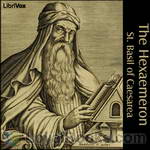 The Hexaemeron
The Hexaemeron
The Hexaemeron is the title of nine homilies delivered by St. Basil on the the cosmogony of the opening chapters of Genesis. When and where they were delivered is quite uncertain. They are Lenten sermons, delivered at both the morning and evening services, and appear to have been listened to by working men. (Hom. iii. 1) Some words in Hom. viii. have confirmed the opinion that they were preached extempore, in accordance with what is believed to have been Basil's ordinary practice. Internal evidence... | |
By: Benedictine Sisters of Perpetual Adoration | |
|---|---|
 Assist the Souls in Purgatory
Assist the Souls in Purgatory
A short little book on Purgatory, the Poor Souls and how we can help them with our prayers. | |
By: Benjamin B. Warfield (1851-1921) | |
|---|---|
 B. B. Warfield Collection, Volume 3
B. B. Warfield Collection, Volume 3
This volume showcases the diversity of Warfield's interests: as a systematic theologian, New Testament scholar, historian and churchman. Included are all the articles Warfield wrote for the journal Bibliotheca Sacra in the year of his death on John Humphrey Noyes and the Oneida Community. The B. B. Warfield Collection, Volume 1 The B. B. Warfield Collection, Volume 2 The B. B. Warfield Collection, Volume 4 | |
 Plan of Salvation
Plan of Salvation
Five Lectures Delivered at The Princeton Summer School of Theology, June, 1914. In these lectures, Warfield distinguishes between different conceptions of salvation: naturalistic vs. supernaturalistic, sacerdotal vs. evangelical, universalistic vs. particularistic which act as a kind of flow chart shwoing what is known in theology as 'the order of decrees'. On page 33 of the text , there is a table that places various branches of the Christian Church within this scheme. - Summary by InTheDesert | |
 B. B. Warfield Collection, Volume 2
B. B. Warfield Collection, Volume 2
Warfield wrote many articles for Bible dictionaries and encyclopedias on diverse subjects and managed to condense dense subjects into the limitations of a short article. This collection contains several articles on the resurrection of Jesus and Warfield's reflections on theological education from his experience as professor of theology and later principal of Princeton Seminary. The B. B. Warfield Collection, Volume 1 The B. B. Warfield Collection, Volume 3 The B. B. Warfield Collection, Volume 4 | |
 B. B. Warfield Collection, Volume 4
B. B. Warfield Collection, Volume 4
This volume contains a prevalence of items relating to Warfield's interests in Christology and in the thought of John Calvin. It also contains his take on questions that many would not dare tackle like "Should one repent of original sin?" and several items of a more personal nature relating to his colleagues, friends and teachers. - Summary by InTheDesert The B. B. Warfield Collection, Volume 1 The B. B. Warfield Collection, Volume 2 The B. B. Warfield Collection, Volume 3 | |
 B. B. Warfield Collection, Volume 1
B. B. Warfield Collection, Volume 1
Many of B. B. Warfield's diverse and erudite theological writings were published as long articles in The Princeton Theological Review, sometimes spanning many issues of the periodical. The articles in this collection showcase the breadth of Warfield's scholarship and interest, his clarity of analysis of cultural trends and his deep Calvinistic piety. The B. B. Warfield Collection, Volume 2 The B. B. Warfield Collection, Volume 3 The B. B. Warfield Collection, Volume 4 | |
By: Bernard of Clairvaux (1090-1153) | |
|---|---|
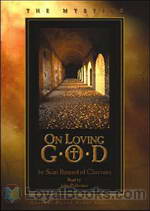 On Loving God
On Loving God
On Loving God is one of the best-known and most influential works of Medieval Christian mysticism. Written at the request of one of the cardinals of Rome, it describes the four “levels” of love for God, and puts Christian devotion in the context of God’s love for mankind. | |
By: Bible in Basic English | |
|---|---|
 Bible (BBE) 29-37: Joel, Amos, Obadiah, Jonah, Micah, Nahum, Habakkuk, Zephaniah, Haggai
Bible (BBE) 29-37: Joel, Amos, Obadiah, Jonah, Micah, Nahum, Habakkuk, Zephaniah, Haggai
The Bible in Basic English, translated by an American committee led by S.H. Hooke, uses Basic English, a simplified English vernacular developed by linguist Charles Kay Ogden for use in teaching English to non-native speakers and as an international auxiliary language. Basic English utilizes a limited vocabulary of around 850 English words. - Summary by Mark Penfold | |
 Bible (BBE) 08: Ruth
Bible (BBE) 08: Ruth
The Bible in Basic English, translated by an American committee led by S.H. Hooke, uses Basic English, a simplified English vernacular developed by linguist Charles Kay Ogden for use in teaching English to non-native speakers and as an international auxiliary language. Basic English utilizes a limited vocabulary of around 850 English words. - Summary by Mark Penfold | |
 Bible (BBE) 01-02: Genesis & Exodus
Bible (BBE) 01-02: Genesis & Exodus
The Bible in Basic English, translated by an American committee led by S.H. Hooke, uses Basic English, a simplified English vernacular developed by linguist Charles Kay Ogden for use in teaching English to non-native speakers and as an international auxiliary language. Basic English utilizes a limited vocabulary of around 850 English words. - Summary by Mark Penfold | |
 Bible (BBE) 15: Ezra
Bible (BBE) 15: Ezra
The Bible in Basic English, translated by an American committee led by S.H. Hooke, uses Basic English, a simplified English vernacular developed by linguist Charles Kay Ogden for use in teaching English to non-native speakers and as an international auxiliary language. Basic English utilizes a limited vocabulary of around 850 English words. - Summary by Mark Penfold | |
 Bible (BBE) 22, 25, 39: Song of Solomon, Lamentations, Malachi
Bible (BBE) 22, 25, 39: Song of Solomon, Lamentations, Malachi
The Bible in Basic English, translated by an American committee led by S.H. Hooke, uses Basic English, a simplified English vernacular developed by linguist Charles Kay Ogden for use in teaching English to non-native speakers and as an international auxiliary language. Basic English utilizes a limited vocabulary of around 850 English words. - Summary by Mark Penfold | |
By: Blaise Pascal | |
|---|---|
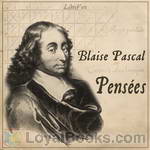 Pensées
Pensées
Pascal’s Pensées is widely considered to be a masterpiece, and a landmark in French prose. When commenting on one particular section (Thought #72), Sainte-Beuve praised it as the finest pages in the French language. Will Durant, in his 11-volume, comprehensive The Story of Civilization series, hailed it as “the most eloquent book in French prose.” In Pensées, Pascal surveys several philosophical paradoxes: infinity and nothing, faith and reason, soul and matter, death and life, meaning and vanity—seemingly arriving at no definitive conclusions besides humility, ignorance, and grace. Rolling these into one he develops Pascal’s Wager. | |
By: Brontë sisters | |
|---|---|
 Selected Poems by Currer, Ellis and Acton Bell
Selected Poems by Currer, Ellis and Acton Bell
Poems by Currer, Ellis and Acton Bell was a volume of poetry published jointly by the three Bronte sisters, Charlotte, Emily and Anne in 1846, and their first work to ever go in print. To evade contemporary prejudice against female writers, the Bronte sisters adopted androgynous first names. Marked by profound sentiments, gravity and melodious harmony, the poems are strewn on the fields of soulful love, rueful reminiscence and the immortal yearnings of a Christian soul, and represent a fragrant assemblage of noetic flowers from the glebes of olden England... | |
By: Brother Ernest Ryan (1897-1963) | |
|---|---|
 Adventures of Tommy Blake
Adventures of Tommy Blake
Child of an atheist father and a devoutly Catholic mother, Tommy has been from childhood the object of a battle of love. Tommy’s courage and unfailing loyalty to his Faith help him to overcome obstacles which threaten his whole future with spiritual tragedy. Brother Ernest Ryan, was a Holy Cross Brother, the founder of and a prolific author for the Dujarie Press, a Catholic publishing house of Juvenile Saint books for children in the 1950’s and 1960’s. He wrote numerous juvenile biographical saint books for children, as well as several children’s fictional titles – of which this is one. | |
By: Brother Lawrence (1605-1691) | |
|---|---|
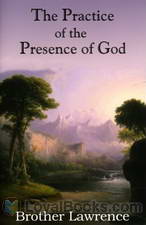 The Practice of the Presence of God
The Practice of the Presence of God
The Practice of the Presence of God is a collection of letters and transcriptions of conversations, compiled by a disciple of Brother Lawrence. Brother Lawrence was a Carmelite monk and head cook in his monastery’s kitchens. He quickly gained an international reputation as a mystic and spiritual counselor. The Practice of the Presence records his last words of advice to his friends and disciples, as he suffered from an unnamed illness which would eventually take his life. (Description written by Kirsten Ferreri). | |
 Spiritual Maxims
Spiritual Maxims
Those who have an experiential predisposition in their faith would do well to read The Conversations and Letters of Brother Lawrence… if they have not done so already. This is a lesser-known work, often overlooked. These Spiritual Maxims were manuscripts found amongst the aforementioned Letters and also written by Brother Lawrence himself. The Maxims are different from the letters — the careful arrangement adopted suggests matured thought and the inference is not unreasonable that he intended them to sum up his teachings... | |
By: Bruce S. Wright | |
|---|---|
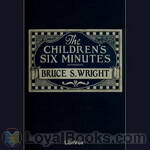 The Children's Six Minutes
The Children's Six Minutes
This is a nice collection of 52 kid-aimed sermons by missionary Wright while he served in the Philippines in the World War I era. Each offers a slice-of-life reference point, an appropriate Bible verse, and hymn. | |